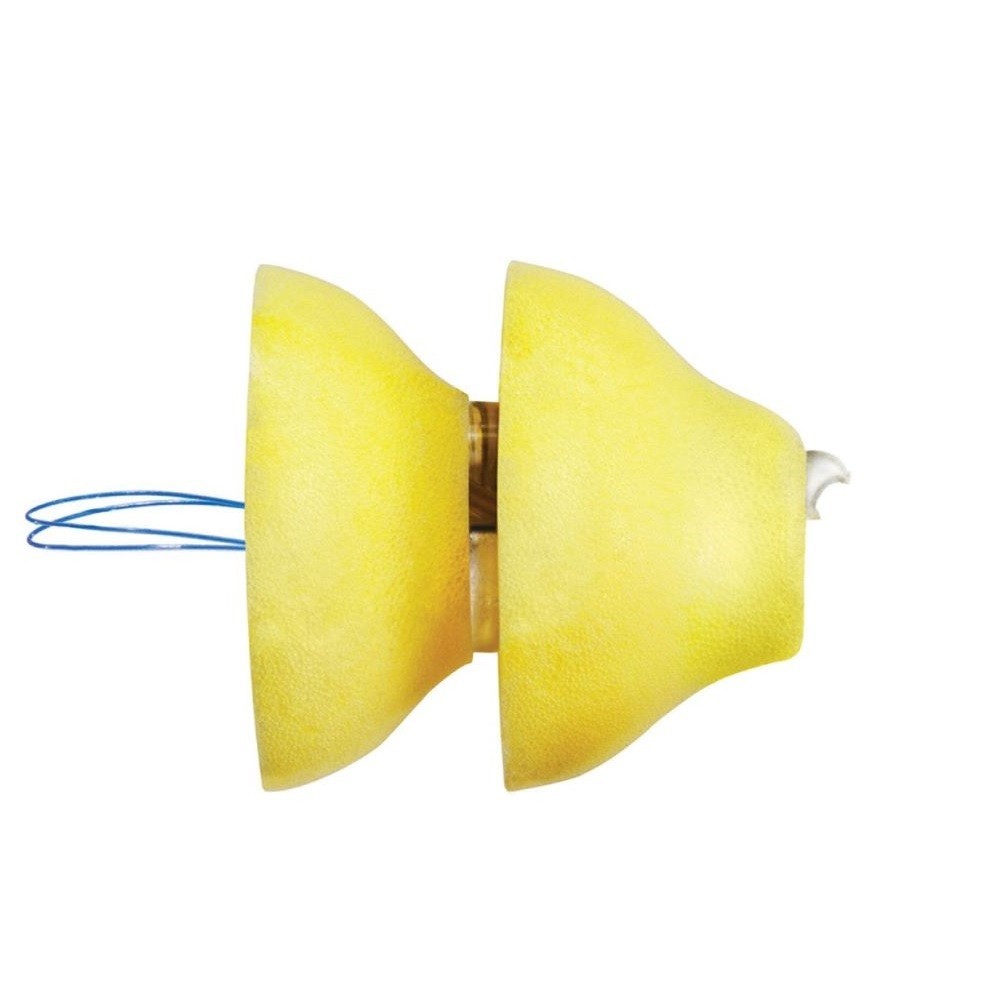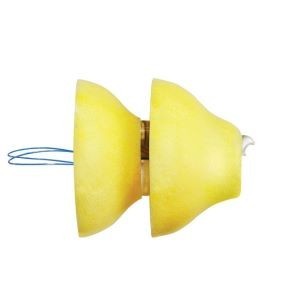In the Ear
Fitting Styles: IIC

What's included in our hearing aid prices?
Details & Features
Phonak Lyric / Lyric3 Hearing Aids
| 2020 Update: The Lyric was launched in 2010 and we no longer sell this product, but if this is something that you are interested in, Phonak have advised us that the guide price for these hearing aids is between £3,000 and £4,000 per year for a pair of aids. Discover more about Invisible In the Canal (IIC) hearing aids and alternatives to the Lyric / Lyric3 here
The Idea Behind Phonak Lyric / Lyric3
Imagine for just a moment, a hearing aid that was invisible, stayed in your ear 24 hours a day, 7 days a week, requiring no batteries to be changed, was comfortable to wear and sounded great. Well, that’s the idea behind the Phonak Lyric. If we are to believe the marketing hype then we may think that the ultimate hearing aid has finally arrived – or has it?
There are many comments published on the internet from wearers. It appears to have what I call “Marmite appeal” – you’ll either love it or you’ll hate it. It is difficult to gauge the true success of this hearing aid as nobody has conducted a real study of its performance etc. This is actually true of all hearing aids and is understandable as the only people with enough resources to fund this would be the manufacturers (and that may render it biased). Phonak did do a limited comparison in 2011 using only 12 hearing aid wearers and this merely concluded that there was “no disadvantage in wearing Lyric hearing aids versus other digital hearing aids”. Hardly research to blow your hair back. Given that there are clearly mixed opinions out there, I will endeavour to present both sides of the argument as fairly as I can.
So what is the Phonak Lyric / Lyric3?
It is a tiny hearing aid that fits completely in the ear canal and in many cases is invisible. It is worn for 24 hours a day, 7 days a week for about 3 or 4 months. It is inserted by an appropriately trained person and every 3 or 4 months it is removed and another one inserted (by the professional). There is no handling by the wearer of either the aid or batteries as the aid is essentially disposable.
Pros and cons of Phonak Lyric / Lyric3 hearing aids
Invisible
Yes, it is but then again there are many invisible hearing aids on the market that fit deep into the ear so it is not unique by any means.
No batteries to handle
This is certainly an advantage if you have poor dexterity.
No removal or insertion
Yes, this is truly a “lifestyle” instrument. No need to put it in on a morning or take it out at night. Having said that, some people like to remove their hearing aids at night. Whilst it is possible to remove the Lyric using the special tool provided, the aids cannot be reinserted. This must be done by a hearing professional so a trip to see them is required.
Technology
Believe it or not, this is only an analogue product. Digital sound processing is very shapeable whereas analogue is quite limited. Even the most basic hearing aids these days are digital. Digital technology usually requires more current drain on the batteries so that is probably the reason they needed to use rather basic analogue technology. If they had used digital technology the battery wouldn’t last as long. I hear through the grapevine that Phonak is looking to introduce a digital Lyric. Given that Phonak’s own “research” has “shown” that the Lyrics analogue processing is no worse than other digital aids, it will be interesting to hear how they explain the need for a digital Lyric. Are they going to admit that digital is better?
Price
This is perhaps the biggest issue. It costs around £130 per month per aid. A hearing aid should last at least 5 years so the cost of a Lyric over this period would come to a staggering £7800. If you need 2 hearing aids as most people do then you’re looking at £15,600. To buy the very best invisible digital hearing technology would only cost around £1500 per hearing aid.
Replacements
The Lyric contains a battery that lasts up to 4 months (perhaps only 3 months in many cases). In order for the aid to be replaced you would need to visit the place where you bought it and have a new one reinserted. The appointment is very quick but for some people, I guess an appointment every 12 weeks or so maybe a bit inconvenient. It is worth considering that if you were away from home, perhaps on business or holiday, and the battery runs out then what do you do? Basically you’re stuck. Yes, you can remove the aid yourself to unblock your ear but you would need to wait until you could visit your audiologist to get a replacement. With any other hearing aid, you would simply change the batteries.
Waterproof?
No, it isn’t. It is “water-resistant”. According to the manufacturers it should not be submerged in water. It will probably be ok to take a shower but not to go swimming in. Not good if you enjoy swimming or are considering a dip in the pool whilst on holiday. Very few hearing aids are waterproof but this one really needed to be as it can’t be reinserted once removed.
Accessories
It is possible to manually adjust the sound level or switch the Lyric off by way of the SoundLync tool provided. Basically this is a magnet that when held near to the ear can alter the volume etc. This is the only accessory.
Wireless connectivity?
In a word, no….. Many hearing aids today have the capability to communicate with the television or telephones etc. but not the Lyric. I guess this is down to the fact that it is not a digital hearing aid.
Candidacy
Not everyone is suitable for Lyric. The fitting range is quite broad so there’s a good chance it will fit your hearing loss. The main problem here is the size and shape of the ear canal. I understand that a good proportion of people are unsuitable but you won’t know until you try.
Phonak Lyric / Lyric3 Conclusion
The general idea behind Lyric is good and Phonak should be applauded for their valiant effort. The price is ridiculously expensive. Whilst there is a convenience factor in not having to change the batteries there is a greater inconvenience factor by having to visit your audiologist every 12 weeks minimum. If you rely on your hearing aids then you may come unstuck when the battery stops working or the aids need to be removed as they cannot be reinserted. The technology is analogue and the sound processing is very basic.
If you’re looking for an invisible hearing aid then there are lots to choose from. Read our article about CIC hearing aids here. In this article, we talk about some great examples of CIC hearing aids on the market -all including great innovative technology and are virtually the same size as the Lyric, if not smaller.
I wonder just how many of these people go on to subscribe to Lyric and how many choose to get a digital hearing aid. Phonak would no doubt benefit either way so perhaps the real benefit of a Lyric is that it generates interest. Is it Holy grail of hearing aids? Perhaps not but by the fact that you’ve read this review suggests that the Lyric has perhaps done its job and done it very well.
Paul Harrison is an audiology expert at Hearing Aid UK, with over 20 years of audiology experience and a member of the British Society of Hearing Aid Audiologists Council (BSHAA) between 2015 - 2020.
Watch the Phonak Lyric Video Below
Our specialist service includes:
Do not spend hundreds of pounds without getting a second opinion from us.
Please call us on 0800 567 7621
 Not only are the prices great, but the service is fantastic! Many thanks to your team.
Not only are the prices great, but the service is fantastic! Many thanks to your team.What's included in our hearing aid prices?
If you are looking at this page then it is likely that an audiologist has suggested that you purchase this particular hearing aid, so is this the best model for you?
In general, any audiologist will always recommend to you the model that best suits your needs. Here is a useful checklist to make sure that is the case.
- Audiologist level of knowledge: The audiologist you have seen will hopefully have a wide knowledge of all available hearing aids, however, some will only be familiar with a small number of brands and therefore may not really be in a position to know which model is the best for you. It is OK to challenge their recommendation and ask them to justify why this particular brand is the one for you.
- Do research: Read about the hearing aid that was recommended. Does it seem like it will suit your lifestyle? Does it have more or fewer features than you need?
- Be aware of sales targets: Many high street retailers have specific tie-ins to a particular manufacturer/brand. The hearing aid they have suggested may still be the correct one for you, but do your research so that you know why they might have recommended it.
If in doubt, feel free to give us a call. That's what we're here for. In the meantime, read all about our review of the best hearing aids for 2025 here
If you have significant hearing loss in both ears, you should be wearing two hearing aids. Here are the audiological reasons why:
Localisation: The brain decodes information from both ears and compares and contrasts them. By analysing the minuscule time delays as well as the difference in the loudness of each sound reaching the ears, the person is able to accurately locate a sound source. Simply put, if you have better hearing on one side than the other, you can't accurately tell what direction sounds are coming from.
Less amplification is required: A phenomenon known as “binaural summation” means that the hearing aids can be set at a lower and more natural volume setting than if you wore only one hearing aid.
Head shadow effect: High frequencies, the part of your hearing that gives clarity and meaning to speech sounds, cannot bend around your head. Only low frequencies can. Therefore if someone is talking on your unaided side you are likely to hear that they are speaking, but be unable to tell what they have said.
Noise reduction: The brain has its own built-in noise reduction which is only really effective when it is receiving information from both ears. If only one ear is aided, even with the best hearing aid in the world, it will be difficult for you to hear in background noise as your brain is trying to retain all of the sounds (including background noise) rather than filtering it out.
Sound quality: We are designed to hear in stereo. Only hearing from one side sounds a lot less natural to us.
Fancy some further reading on this topic? You can read about why two hearing aids are better than one in our article, hearing aids for both ears, here
For most people, the main benefit of a rechargeable hearing aid is simple convenience. We are used to plugging in our phones and other devices overnight for them to charge up. Here are some other pros and cons:
For anybody with poor dexterity or issues with their fingers, having a rechargeable aid makes a huge difference as normal hearing aid batteries are quite small and some people find them fiddly to change.
One downside is that if you forget to charge your hearing aid, then it is a problem that can't be instantly fixed. For most a 30-minute charge will get you at least two or three hours of hearing, but if you are the type of person who is likely to forget to plug them in regularly then you're probably better off with standard batteries.
Rechargeable aids are also a little bit bigger and are only available in Behind the Ear models.
Finally, just like with a mobile phone, the amount of charge you get on day one is not going to be the same as you get a few years down the line. Be sure to ask what the policy is with the manufacturer warranty when it comes to replacing the battery.
Looking for more information on rechargeable hearing aids? Read our dedicated page on the topic here
For most people, the answer is yes. But it's never that simple.
The majority of hearing problems affect the high frequencies a lot more than the low ones. Therefore open fitting hearing aids sound a lot more natural and ones that block your ears up can make your own voice sound like you are talking with your head in a bucket. Therefore in-ear aids tend to be less natural.
However the true answer is we can't tell until we have had a look in your ears to assess the size of your ear canal, and until we have tested your hearing to see which frequencies are being affected.
People with wider ear canals tend to have more flexibility, also there are open fitting modular CIC hearing aids now that do not block your ears.
There is also the age old rule to consider, that a hearing aid will not help you if it's sat in the drawer gathering dust. If the only hearing aid you would be happy wearing is one that people can't see, then that's what you should get.
Most people can adapt to any type of hearing aid, as long as they know what to expect. Have an honest conversation with your audiologist as to what your needs are.
Generally speaking, six or more. Unless it's none at all.
The number of channels a hearing aid has is often a simplistic way an audiologist will use to explain why one hearing aid is better than another, but channels are complex and it is really not that straightforward. Here are some reasons why:
Hearing aids amplify sounds of different frequencies by different amounts. Most people have lost more high frequencies than low and therefore need more amplification in the high frequencies. The range of sounds you hear are split into frequency bands or channels and the hearing aids are set to provide the right amount of hearing at each frequency level.
Less than six channels and this cannot be done with much accuracy, so six is the magic number. However, a six channel aid is typically very basic with few other features and is suitable only for hearing a single speaker in a quiet room. The number of channels is not what you should be looking at, it's more the rest of the technology that comes with them.
As a final note, different manufacturers have different approaches. One method is not necessarily better than any other. For example, some manufacturers have as many as 64 channels in their top aids. Most tend to have between 17 and 20. One manufacturer has no channels at all.
Hearing aids are easily lost, misplaced or damaged and typically are one of the most expensive personal possessions an individual can own. We offer hearing aid warranty coverage for £80 per year per aid. Find out more about this service we provide here
All our audiologists use the very latest technology and provide the full range of tests to accurately measure your hearing for free. Find out about what hearing healthcare services we offer all our customers here
Hearing Aid UK offers all their customers free home visiting services, even in a care home environment, for no extra cost. Including hearing tests, fittings, maintenance, check-ups and much more in the comfort of your own home and at your convenience. Find out more information about our home visits here
Here, at Hearing Aid UK, we are dedicated to offering low hearing aid prices. We achieve this by having no head office and low marketing costs. Our hearing aid prices are amongst the lowest you will find anywhere in the world. Explore our prices, brands, and models here
Other Models
Ask the Experts
6 Morton Lane
Walkwood
Redditch
Worcestershire
B97 5QA
Latest Launch
When we refer to a product as 'Latest Launch', we mean it is the latest to be released on the market.
New
When we refer to a product as 'New', we mean that the product is the newest hearing aid model on the market.
When we refer to a product as 'Superseded', we mean that there is a newer range available which replaces and improves on this product.
Older Model
When we refer to a product as an 'Older Model', we mean that it is has been superseded by at least two more recent hearing aid ranges.





